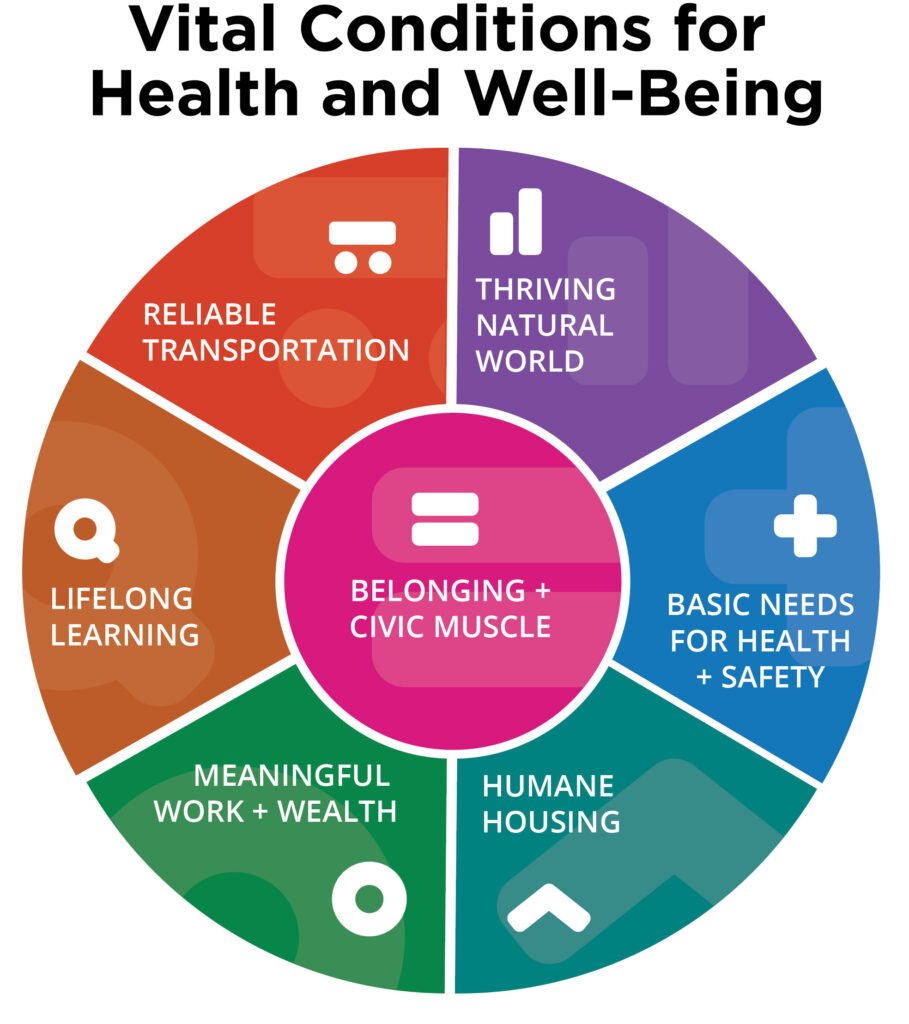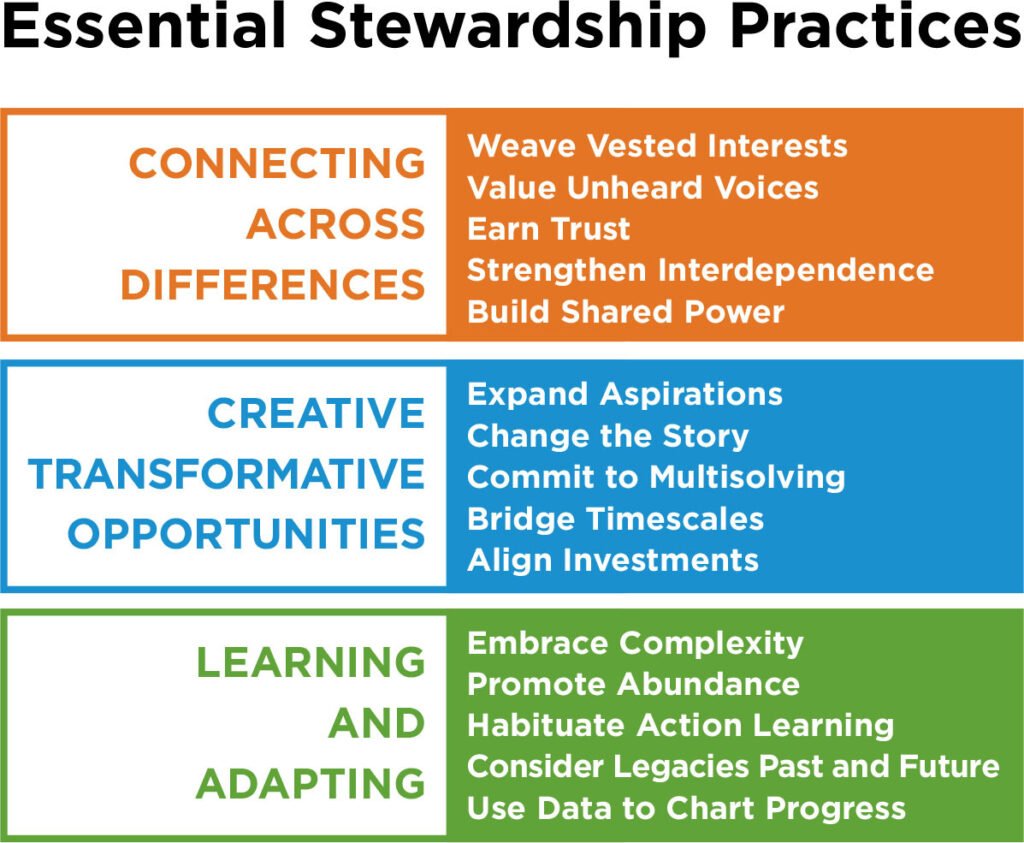
An “exhausted majority” is hungry for a country where everyone, not just a few, has the opportunity to thrive. Yet the quest for health equity has been stymied.
The lack of meaningful health equity progress is due to business-as-usual approaches and interventions focused on getting quick results—which are often temporary, weak, and ineffective. To produce sustainable, lasting systemic change, we must think and act differently. We must move beyond temporary efforts to help people in crisis and wrestle with what is needed to address persistent and entrenched inequities rooted in legacies of injustice.
“Vital conditions” refers to the properties of places and institutions that all people need for health and wellbeing.
At the Rippel Foundation, we are part of a broad movement to change this. This effort focuses on the Vital Conditions for Health and Well-Being and shared stewardship—a collaborative, power-sharing approach to improving health and wellbeing.
What is the Vital Conditions Framework?
The phrase “vital conditions” refers to the properties of places and institutions that all people need for health and wellbeing. This includes basic needs for health and safety, a thriving natural world, humane housing, meaningful work and wealth, lifelong learning, reliable transportation, and, central to all, belonging and civic muscle that enable everyday community members to shape their futures.

With support from the Robert Wood Johnson Foundation and others, we developed the vital conditions framework. The vital conditions are an evolution, not a replacement, of the social determinants model that has been prevalent since the early 2000s. The vital conditions framework aims to shift how people think about health and wellbeing, particularly by recognizing the shortcomings of overreliance on urgent services.
Urgent services include everything from urgent care clinics to food pantries and homeless shelters, or services needed following a shock like a natural disaster or pandemic. While urgent services are necessary, they can never advance enduring health equity and wellbeing. The vital conditions framework, we believe, can help communities break out of the cycle of overreliance on urgent services by shifting community focus to solutions that align with lasting, systemic change.
Last year, this framework was adopted by 44 federal agencies through the Federal Plan for Equitable Long-Term Recovery and Resilience (ELTRR), with even more agencies joining since. The ELTRR is referenced in a recent publication by the National Academies of Sciences, Engineering, and Medicine (NASEM), Federal Policy to Advance Racial, Ethnic, and Tribal Health Equity, as a critical federal strategy.
There is tremendous opportunity for alignment of national, regional, tribal, state, and local systems as the vital conditions framework gains traction among philanthropies and nonprofits looking to transform the systems within which their programs operate. We can create alignment that lets real, lasting change take hold, but it will require everyday acts of courage—by stewards—to lead differently.
The vital conditions framework aims to shift how people think about health and wellbeing, particularly by recognizing the shortcomings of overreliance on urgent services.
The Promise of Shared Stewardship to Support Vital Conditions
Stewardship, though far from a new practice, is a departure from the way many of us might think of leadership, as focused on advancing individual or organizational interests. Instead, it’s driven by expansive collaboration, consensus building, and shared action; it acknowledges that no individual or institution alone can create the kind of change needed to support everyone’s ability to thrive.
Stewards understand that relying on evidence that fails to capture the experience and voices of underrepresented populations undermines equity goals. Stewards reject the notion of a zero-sum game and embrace the well-founded approach that the best way to narrow or eliminate a gap is by improving the experience and outcomes of those with the biggest gains to make. The legacy of disability advocates provides a clear example of why working at the margins matters: we all benefit from more accessible designs like curb cuts and audible crosswalks. The universality of such wins illustrates why shared stewardship is such a powerful key to progress.
Liz Baxter, CEO of North Sound ACH in Northwest Washington State, is an excellent example of this approach. North Sound ACH is one of several Accountable Communities for Health (ACH) created to reduce costs and improve health outcomes by addressing social determinants of health.
North Sound ACH operates in a region with multiple health equity challenges fueled by barriers facing immigrant and refugee populations and extreme income disparity. According to Baxter, in San Juan County, part of a five-county region where she works, “You either own three homes or work three jobs.” Of the area’s 1.2 million residents, half spend more than 30 percent of their income on rent.
Unwilling to accept the limitations of the social determinants of health approach, North Sound ACH adopted the Vital Conditions for Health and Well-Being as its guiding framework. When a Skagit County newspaper reporter asked about language access in relation to voting, Baxter and the team saw the health equity connection with civic engagement and seized the opportunity to act.
Skagit County had not yet reached the population threshold of the Voting Rights Act that requires ballots to be translated, marginalizing many members of the community and minimizing their civic engagement. Baxter approached the county, offering to fund a Spanish-language voter education program if the county made ballots available in Spanish. The link between voting access and health outcomes is increasingly evident, and the centrality of belonging and civic muscle in the vital conditions framework makes what to do about it explicit and actionable.
BeWellPBC in Palm Beach County, FL, offers a second example of the value of this approach. BeWellPBC was founded to improve behavioral health outcomes for residents who face similar challenges to those in North Sound. Palm Beach is one of the wealthiest counties in the nation, yet 44 percent of households struggle to make ends meet. As in North Sound, there is a significant migrant farming community due to large agricultural businesses. Nearly half of the county’s population is made up of Black and Latinx residents.
BeWellPBC has committed to expanding vital conditions—looking beyond the narrow scope of behavioral health interventions to propel broader systems change—through efforts like the Community Connector program, a forum for the community to have meaningful conversations about behavioral health and provide a feedback loop to systems leaders in health care and government. BeWellPBC is also shifting grantmaking to support community-led efforts and making systemic changes to increase diversity in the mental health profession.
North Sound ACH and BeWellPBC are leaning into the transformational practices of shared stewardship, and they are seeing early signs of the progress needed to create thriving communities.
Sign up for our free newsletters
Subscribe to NPQ's newsletters to have our top stories delivered directly to your inbox.
By signing up, you agree to our privacy policy and terms of use, and to receive messages from NPQ and our partners.
Essential Stewardship Practices
Stewardship is not a solo act; it powerfully brings together diverse individuals and organizations to connect across differences and integrate interdisciplinary, multisector, multiracial, and multicultural perspectives. It fosters a commitment to the values we have in common rather than focusing on the things that divide us.
Three categories of essential stewardship practices are critical for supporting system change anchored in equity:
- Connect across differences to build trusting relationships
- Create opportunities to transform systems for all to thrive
- Learn and adapt to navigate the future together

Connect across differences. Both North Sound ACH and BeWellPBC regularly convene dozens of stewards—from organizational leaders to community members—across sectors and fields. These gatherings offer the rich diversity of voices and perspectives of community members and create the conditions for everyone to feel they belong, are valued, and are heard.
For example, Van Dinh-Kuno, executive director of Refugee & Immigrant Services Northwest credits convenings led by North Sound ACH with helping “to change the way people think about refugees and immigrants, leading to better outcomes for our new neighbors and also for all people in the region.” RISNW works with refugees from Afghanistan, Somalia, Syria, the Democratic Republic of Congo, Burma, Iran, Iraq, Ukraine, Colombia, and Eritrea. Many need to find work to support their families. At the same time, local employers have been experiencing a worker shortage.
Dinh-Kuno collaborated with Baxter and business sector stewards to create job fairs in the new arrivals’ native languages, which were supported with funding from North Sound ACH. Immigrants and refugees secured work, and local employers solved their workforce shortages. Of course, longstanding evidence demonstrates that having a good-paying job has major positive effects on health outcomes.
Create transformative opportunities. Shared stewardship also helps address multifaceted problems to support transformative systems change.
Even before the COVID-related surge in mental health challenges for young people, Tammy K. Fields, director of Palm Beach County Youth Services Department, had sounded the alarm about the shortage of mental health professionals and the stigma keeping youth from seeking care. “We thought about a rapid response to the problem, something like promoting internships to college students. But we quickly realized we needed to create bigger, broader opportunities.” That thinking led Fields and other stewards working with BeWellPBC to partner with the school district to develop a high school behavioral health curriculum and accreditation process that sustains career pathways for students and addresses stigma by having participants talk to their peers about the importance of mental healthcare. The program is now being expanded statewide.
Stewards in Palm Beach County are also building trust and embracing the unique contributions of community members like Tessie Watts. Watts pursued leadership training when she was told she didn’t have the right set of skills to advance in her job. She knew others likely faced similar gaps. When an opportunity arose for a new $2,000 microgrant from a local foundation, Watts applied and used the funding to launch a six-week leadership skills boot camp for community members. Since 2019 she has provided leadership training for about 500 residents.
The microgrant model is a vast departure from traditional philanthropy, and paved the way for broader systems change. BeWellPBC has since provided $100,000 to community members who have used the funding to implement community-designed, community-led approaches to social isolation, community healing, and workforce wellness.
Learn and adapt. Stewards must be comfortable with the ambiguity that exists in pursuit of social change.
Jason McGill, executive director of Northwest Youth Services, an organization that supports young people experiencing housing insecurity, embodies the stewardship practice of learning and adapting. He recognized that his programs were designed without important participant perspectives and developed a youth advisory board that, thanks to a grant from North Sound ACH, formalized the importance of youth contributions and compensated participants for their time. As a result, the board built belonging and civic muscle, engaged unheard voices, and enabled power sharing—leading to program changes that address systemic barriers to stability and wealth building.
Stewardship leverages the contributions of others and breaks us out of a transactional, short-term mindset.
For example, youth are working with policymakers to change state laws to make it illegal to ask about criminal justice histories on job and housing applications, advancing the vital condition of humane housing, among other goals. Housing insecurity, of course, leads to higher morbidity and mortality. Baxter notes that a core value of this approach is that it “move[s] young voices squarely into the frame of informing and leading strategies that impact them, recognizing that we cannot build a future state for them without them.”
Forging a Path to Health Equity
To produce sustainable, lasting systemic change, we must think and act differently. We must move beyond temporary efforts to help people in crisis and wrestle with what is needed to address persistent and entrenched inequities that keep them in crisis.
Stewardship leverages the contributions of others and breaks us out of a transactional, short-term mindset that has limited many efforts to date. The vital conditions framework creates space for all sectors and people in a community to play a role in advancing equitable health and wellbeing.
There is much to do, but there is some good news in this. Amid news cycles that focus on division, there are abundant signs of hope and progress. These stories of real-world stewards are just a few of many who are employing purposeful dialogue and multisector collaboration to advance an equitable future in which everyone can thrive.
How can people support this work? It starts with promoting fresh thinking that shifts mindsets and actions, elevates the assets and power of underrepresented communities, ensures that community voices and perspectives are heard and honored, and resists quick fixes in favor of investments to expand the vital conditions necessary for equitable health and wellbeing. This looks different in every community, but it is a path we must all walk together to achieve and sustain health equity.









